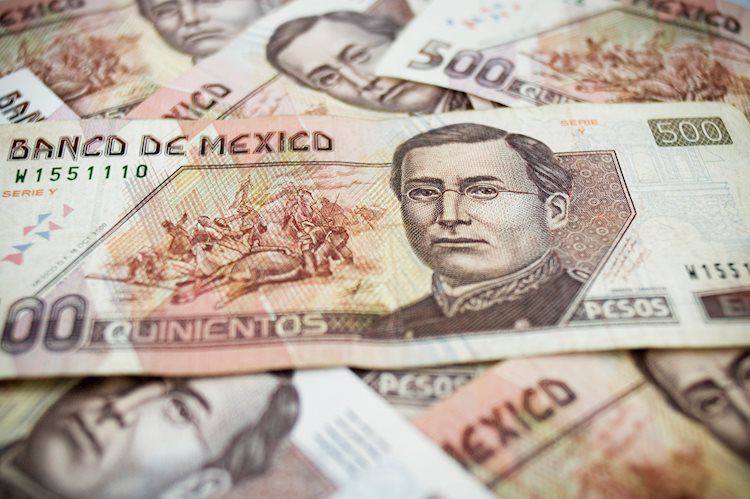- Mexican Peso stalls the USD/MXN rally towards 18.00, as the pair clings to losses of 0.02%.
- The University of Michigan consumer sentiment indicates growing pessimism amongst Americans as inflation expectations rise.
- Dovish comments from Fed officials, including Philadelphia Fed President Patrick Harker, suggest a rate hike pause.
Mexican Peso (MXN) calmly stands off against the US Dollar (USD) on Friday, cutting short the Dollar’s rally after Thursday’s United States (US) inflation report spurred an overreaction in financial markets, triggering concerns the US Federal Reserve (Fed) could hike rates again. Recent dovish comments by Fed officials further cap the US Dollar’s advance, benefiting the emerging market currency, as the USD/MXN trades at around 17.94, down 0.17%.
Thursday’s US inflation report exceeded estimates, spurring investors to price in a possible rate hike from the US central bank. Nevertheless, dovish commentaries since Monday suggest the Fed is almost done raising rates, a stance gaining more adepts; as Philadelphia Fed President Patrick Harker said recently, the “Fed is likely to be done with rate hikes.”
On the data front, the University of Michigan (UoM) consumer sentiment shows Americans turning pessimistic while revising its inflation prospects upward. Mexico’s economic docket is absent, leaving traders adrift to US Dollar dynamics and risk sentiment, which is deteriorating as Wall Street posts losses.
Daily Digest Market Movers: Mexican Peso recovers some ground, though it remains at risk of further depreciation
- In October, the University of Michigan’s Consumer Sentiment came in at 63, below estimates of 67.2 and beneath the previous month’s 68.1.
- Inflation expectations for one year rose from 3.2% to 3.8%, while for five years jumped to 3% from 2.8%.
- Mexico’s Industrial Production (IP) for August improved by 5.2% YoY, exceeding forecasts of 4.6% and July’s 4.8% increase.
- Monthly, IP in Mexico rose 0.3% as expected but trailed the previous 0.5% reading.
- The US Consumer Price Index increased 3.7% YoY in September, unchanged from August but above forecasts of 3.6%.
- US core CPI dipped as expected to 4.1% from 4.3% in August.
- Initial Jobless Claims in the US for the week ending October 7 came in at 209K, below forecasts of 210K.
- Mexico’s Consumer Price Index (CPI) grew by 4.45% YoY in September, slightly below the 4.47% estimated.
- The core CPI inflation in Mexico stood at a stickier 5.76% YoY, as widely estimated, but has broken below the 6% threshold.
- The Bank of Mexico (Banxico) held rates at 11.25% in September and revised its inflation projections from 3.50% to 3.87% for 2024, above the central bank’s 3% target (plus or minus 1%).
Technical Analysis: Mexican Peso oscillates below 18.00
The Mexican Peso gains ground, but remains at the risk of further selling pressure, as the USD/MXN exchange rate sits just below the psychological 18.00 barrier, which is attracting bids, as the pair has traded along the 17.90/18.00 area during the last hour. A breach of that area could open the door to test the October 12 high at 18.08, followed by a rally to the 18.20 mark. Once cleared, the pair could aim toward the latest cycle high of 18.48. Conversely, the exotic pair could extend its losses if it stays below 18.00, with sellers targeting the 200-day Simple Moving Average (SMA) at 17.76.
Banxico FAQs
The Bank of Mexico, also known as Banxico, is the country’s central bank. Its mission is to preserve the value of Mexico’s currency, the Mexican Peso (MXN), and to set the monetary policy. To this end, its main objective is to maintain low and stable inflation within target levels – at or close to its target of 3%, the midpoint in a tolerance band of between 2% and 4%.
The main tool of the Banxico to guide monetary policy is by setting interest rates. When inflation is above target, the bank will attempt to tame it by raising rates, making it more expensive for households and businesses to borrow money and thus cooling the economy. Higher interest rates are generally positive for the Mexican Peso (MXN) as they lead to higher yields, making the country a more attractive place for investors. On the contrary, lower interest rates tend to weaken MXN. The rate differential with the USD, or how the Banxico is expected to set interest rates compared with the US Federal Reserve (Fed), is a key factor.
Banxico meets eight times a year, and its monetary policy is greatly influenced by decisions of the US Federal Reserve (Fed). Therefore, the central bank’s decision-making committee usually gathers a week after the Fed. In doing so, Banxico reacts and sometimes anticipates monetary policy measures set by the Federal Reserve. For example, after the Covid-19 pandemic, before the Fed raised rates, Banxico did it first in an attempt to diminish the chances of a substantial depreciation of the Mexican Peso (MXN) and to prevent capital outflows that could destabilize the country.
